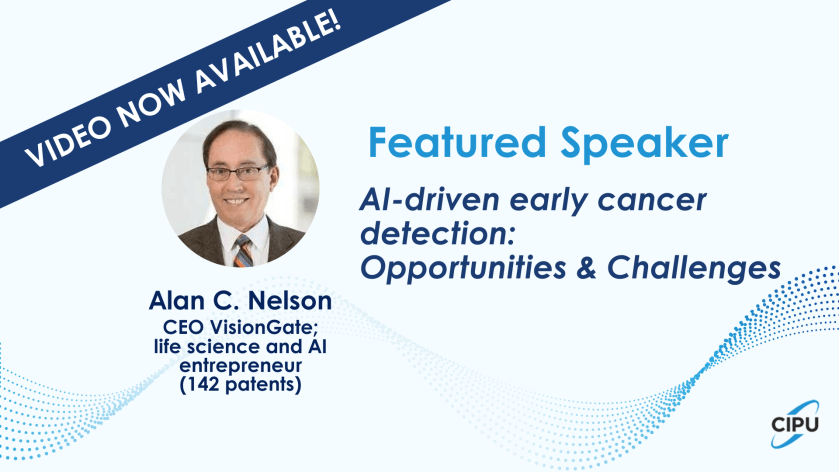Alan Nelson, a pioneering biomedical engineer and entrepreneur, shared his three-decades of experience with AI machine learning at the recent IP Awareness Summit. The science, he explains, was often more manageable than getting government agencies like the FDA, FTC and USPTO to surmount a steep learning curve.
The video of his recent keynote dropped today on CIPU’s YouTube channel.
The considerable challenges Dr. Nelson and his companies faced regarding breakthrough diagnostic inventions were compounded by lack of awareness on the part of regulators.
Necessary Knowledge
When he learned that experts at government agencies empowered to approve his leading edge inventions and enable them to be taken to market lacked the knowledge to assess them, he did not give up. He patiently sought to bring the agencies up to speed through meetings and dialogue.
Artificial intelligence, algorithms and other developments were relatively new to them and their reliability unproven.
Dr. Nelson was candid about his journey. He told the audience in a memorable keynote presentation at the 7th Annual Intellectual Property Awareness Summit held recently by the Center for Intellectual Property Understanding at Northwestern University, that the FDA, FTC and USPTO were not always equipped to discern the originality and efficacy of some of his inventions.
“Back then there were no high speed GPU’s for AI like we have today. We had to build our own. One day, the CIA, FBI and local law enforcement appeared at our office and not only shut us down – they locked us in. No one could leave. The authorities stayed for four days, until they were satisfied we were not going to use our advanced chips for anything other than life science.”
Dr. Nelson, a UC Berkeley-trained physicist who has amassed 142 patents, related how he overcame obstacles to commercializing his breakthrough technology for detecting cervical cancer in the 1990s.
Using artificial intelligence while at the University of Washington, Dr. Nelson automated and vastly improved how early cervical cancer can be detected. He and his team invented a machine to read Pap smears. Unfortunately, it met with resistance on the part of government agencies.
Nelson automated and vastly improved how early cervical cancer can be detected. He and his team invented a machine to read Pap smears. Unfortunately, it met with resistance on the part of government agencies.
Jobs or Women’s Lives?
USPTO rejections and fear that the FDA approval would threaten pathologists jobs was a part of the resistance to his inventions.
Currently, he is working on diagnosis of early stage lung cancer, a disease. In 2021, 134,592 people died from lung cancer, or 22% of all cancer deaths.
To see the video of his presentation on CIPU’s YouTube channel, AI-driven early cancer detection: Opportunities and challenges, which dropped today, tap the link.
To read Forbes contributor Madeleine Key’s IPAS report, go here.
- An interview with Dr. Nelson that reveals his method of working with artificial intelligence and how he overcame impediments will drop next week on the “Understanding IP Matters” podcast. You can subscribe to the podcast on YouTube or your favorite platform.
Good IP Behavior
It’s not always clear how businesses and consumers are supposed to act when it comes to IP rights. Ignore them? Use (steal) them until caught? What is good for investors may not be good for innovation or creators.
In the digital and now AI-age, IP theft has become a virtual way of life.
Also, available today on CIPU’s YouTube channel from this year’s IP Summit is the panel Back to Basics: Identifying and nurturing good IP behavior.
Innovation and IP policy expert Adam Mossoff moderated. Mossoff brings out the best in panelists Jerry Ma, Director of Emerging Technologies and AI at the USPTO; Patrick Kilbride, Senior Vice President of the Global Innovation Policy Center; and Albhy Galuten, two-time Grammy winning producer, musician, inventor and an Intertrust Fellow, who has participated in over 100 million record sales .
Image source: Reda Akazaz; CIPU


